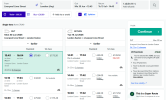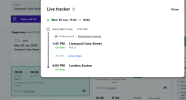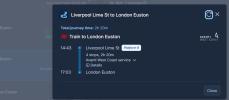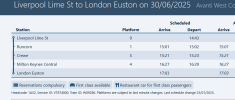They play a huge role in revenue/demand management and for some stations, also have a safety or disability aspect/angle.
For example, TOCs try to ensure that reservations can't be made in coaches that don't fit on a certain platform, e.g. at Haymarket on Avanti or quite a few on GWR. Important for everyone, but especially for those who are in a wheelchair. It nudges all passengers to take a seat in a coach that is appropriate to their journey.
I may be missing something, but why does that example require tagging the journey as reservations compulsory? The journey planners will already facilitate this for specific journeys, and in the case of somebody having a flexible ticket (which are still sold of course), it doesn't help that user, as they're not really going to buy a flexible ticket then go back later and reserve a seat
only because it originally showed up as reservations compulsory, particularly given most journey planners don't show this information up-front.
E.g. in OP's example, Liverpool to London on Avanti, if I search for that on Trainline, I have to click onto the '2h 21m, no changes' link (which would I, for a direct train?) before this information is presented.


On the forum's ticketing website, it's actually 3 steps to get to it - you have to click the little 'i' icon next to 'direct', then click on '(i) details' on the modal which appears:



It seems more a way of restricting certain ticket purchases than something designed to help passengers?
Also in any case, it is a lie. Reservations are not compulsory. In fact the trains will have between 1 and 3 unreserved standard class coaches. In the latter case, over a quarter of the train is specifically designated for passengers who don't have a reservation!





